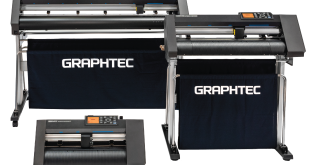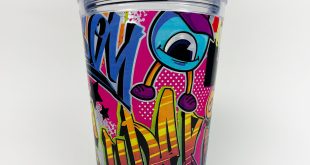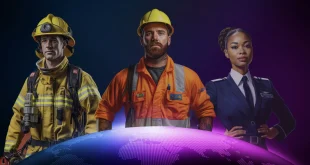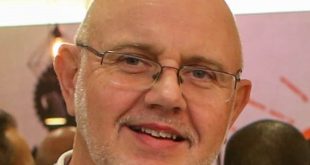
Scott Annetts and Martin Smith may be relative newcomers to supplying and distributing embroidery machinery, but not when it comes to how long they have worked in the industry. Between the two men they have more than five decades of embroidery experience and now they are embarking on a new phase in their careers. P&P editor Melanie Attlesey meets the faces behind Holiauma UK.
“The hardest part about this project was learning how to pronounce the name,” exclaims Scott.
And he’s not wrong. For those who want to practice it’s pronounced HOLLY-O-MA.
Anyone choosing to start a new business at a time when the world and the UK is still in the midst of a global pandemic is surely braver than most.
But that is just what Martin and Scott have done with the launch of Holiauma UK. The pair have spent the past 18 months working to bring to the UK a range of embroidery machines intended to rival the current market leaders.
The origins
This story begins four years ago, when the two men met at an exhibition. Since meeting they have become firm friends and helped each other out from time to time – their embroidery businesses being far enough apart in the country to not consider the other as competition. It was not until last year when Martin needed a new embroidery machine that the two men got talking about the poor-quality service and lack of aftercare from suppliers that they have both experienced. And so, believing they could do better and provide a much-needed change to service levels in the industry, they decided to embark on this business venture together. The only thing missing was a brand to bring to market.
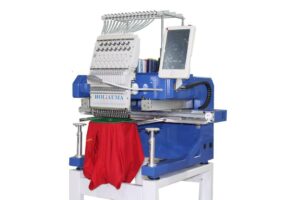
This was not a decision taken on a whim. Both men come from good embroidery stock and have been around embroidery machinery long enough to know what to expect from a good machine.
When Scott was a child, his parents ran a very successful sewing factory in Yorkshire. Scott helped out on the sewing machines during the school holidays from around the age of 15. “My dad was a firm believer that if you wanted to get ahead in life you had to graft. And if you wanted your pocket money, you had to get out of bed and work for it,” says Scott.
Scott trained to become a sewing machine mechanic at college and upon leaving began working for a factory that made underwear for British Home Stores and Marks & Spencer. As the world began to change and manufacturing began to head overseas, Scott went to back to college to retrain as a tailor, the idea being that he could use these skills to help the family business offer something different to customers. However, with his dad’s reluctance to stop manufacturing in the UK, the doors shut for good in 1998, leaving Scott very skilled in an industry that was declining.

“My dad had a little Toyota single-head that I used to run for him when he wanted to do little bits in-house for speed. And I thought if everyone is buying offshore that maybe the future lies in embroidery,” explains Scott.
Running with this idea, in 1999 he formed S&S Clothing with his wife Sharron, specialising in made to order chef’s uniforms for a company in Rotherham. A small part of the business was manufacturing, the other part was embroidery. The business eventually moved into schoolwear, moving away from manufacturing and focusing solely on embroidery. After a few years, Scott fancied a break and became an embroidery machine technician. He spent time out on the road, installing, repairing and training customers. However, after seeing the industry from the other side, Scott began to recognise the importance of good quality service and training. He stepped away from this role just before COVID-19 struck in March last year to rejoin the family business. “I probably should have done this years ago. Life’s great the moment,” Scott adds.
Martin’s story is a whole different kettle of fish. His career started life in London working for big name banks and financial institutions, focusing on customer relations and training in his latter years. After being made redundant a few times in the 80s and 90s, the final time came as Martin was approaching his 40s. This got him thinking that perhaps it was time to do something different with his career.
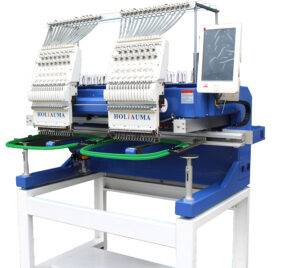
At the time his father-in-law David Baynham ran a very successful knitwear business, but was looking to retire and had already sold off half his business. Martin not only bought out his father-in-law, but bought back the half that had been sold. Over the last 12 or 13 years, Martin has built up the business from a one-man band to now employing a small team of seven under the name School Uniform Direct. During those years, Martin realised that subbing out embroidery work was not beneficial and so brought this in-house with the investment of a few machines. “One thing that my father-in-law taught me is that your business is only as good as the service you give your customers. If you provide a good service to the schools and the parents they won’t leave,” adds Martin.
Where we are today
This brings us right up to speed with where we are today. The two men have formed the business Holiauma UK, having been appointed the sole UK distributor for the Holiauma range of embroidery machines.
Scott says: “After a few light conversations, it gets the cogs whirring and after a lot of research you find that there are opportunities to be had.”
After endless amounts of talking on forums and hours of research, the pair discovered Holiauma and found the Chinese-made machines were selling well across Europe, but had yet to gain a foothold in the UK. After countless conversations with the manufacturers in China about the quality and craftsmanship, both Scott and Martin felt that with these high-quality machines and the level of service and training they plan to provide means they have something different to offer the UK market.
The range currently stands at a single-head, a two-head, a four-head, a six-head and an eight-head. Scott says they expect the single-head and two-head in particular to be very popular in the UK, due to their price point being ideal for business start-ups and beginners. This will be the duo’s target market to begin with, with the aim that as these businesses grow, in years to come they will purchase larger machines. Scott adds that the single-head has what he believes to be the largest sewing field in the industry at 400x600mm on a standard sized machine, and the Y axis for embroidering caps is also one of the largest at 100mm.
The machines are high-speed and run at 1,200 stitches a minute. As standard, each machine in the range is fitted with an automatic oiling system, which users need to pump once a day to send oil to all the moving parts. The 47 head type on each machine is the newest on the market, which allows the machines to run at high-speed for caps and provide high-quality embroideries. Besides all of this, each machine has standard features such as built-in WiFi and a graffiti function with a stylus.
“All in all, these machines have all of the features that the other big brands have. Including the ability to see any colour changes and the design at the same time, which is one feature I am so happy these machines have,” says Scott.
Overcoming stigma
Over the years the stigma surrounding Chinese-made embroidery machinery has greatly reduced. Scott and Martin are quick to say that these machines will more than rival any others currently on sale in the UK. “Times are changing,” says Scott. “The factory that manufactures these machines only makes embroidery machines and has been doing so for more than two decades and the quality is so high.”
Martin says the team over in China have been more than thorough in their due diligence of the UK market and understanding of what Martin and Scott can do for them. Any question that the pair have asked the factory has been answered with an inordinate amount of detail. He adds that the manufacturers are 100% behind them and supporting them with whatever they need to succeed.
One thing that both men are in agreement about is the last thing they want to do is employ a salesman. “Martin and myself don’t want to become car salesmen. We don’t want to sell a product, we want to offer a service,” says Scott.
This might sound strange when the aim of the game is to sell machinery. Instead, potential customers can spend a day in Scott and Martin’s own production settings in Barnsley and Waltham Abbey and run the machines themselves, bring their own DST files, a box of garments and really put the machines through their paces. Given the fact that Scott estimates that 90% of machine faults are down to user error, the two men are highly confident that with the right training and support the machines will speak for themselves. Even to the point where if a customer is not completely satisfied with their purchase after eight weeks, the machine will be picked up, no questions asked and the customer will be reimbursed. And if a customer’s machine stops working and can’t be fixed there and then, Martin and Scott will always arrive with a like-for-like machine in the back of the van so the customer is not left without a machine for weeks on end.
Excellent training
Martin and Scott are using their own personal experience of the embroidery industry to up the level of training and service they will offer customers, something which they believe will be their USP. “The level of training that you give a complete beginner buying a single-head compared to a guy buying a 12-head who has already got 10 machines is completely different, and we recognise that. The beginner will need to know about needles, backings, garment stretch etc. The only thing that stops that person coming back to you and buying more machines as they grow their business is the level of service and training you provide,” says Scott.
The Holiauma range of machines has now arrived in the UK, but if you can’t get away from the daily grind any time soon to pay Martin and Scott a visit, you can see these machines in action at Printwear & Promotion LIVE! in February.
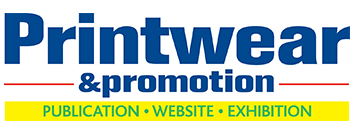 Printwear & Promotion The Total Promotional Package
Printwear & Promotion The Total Promotional Package
